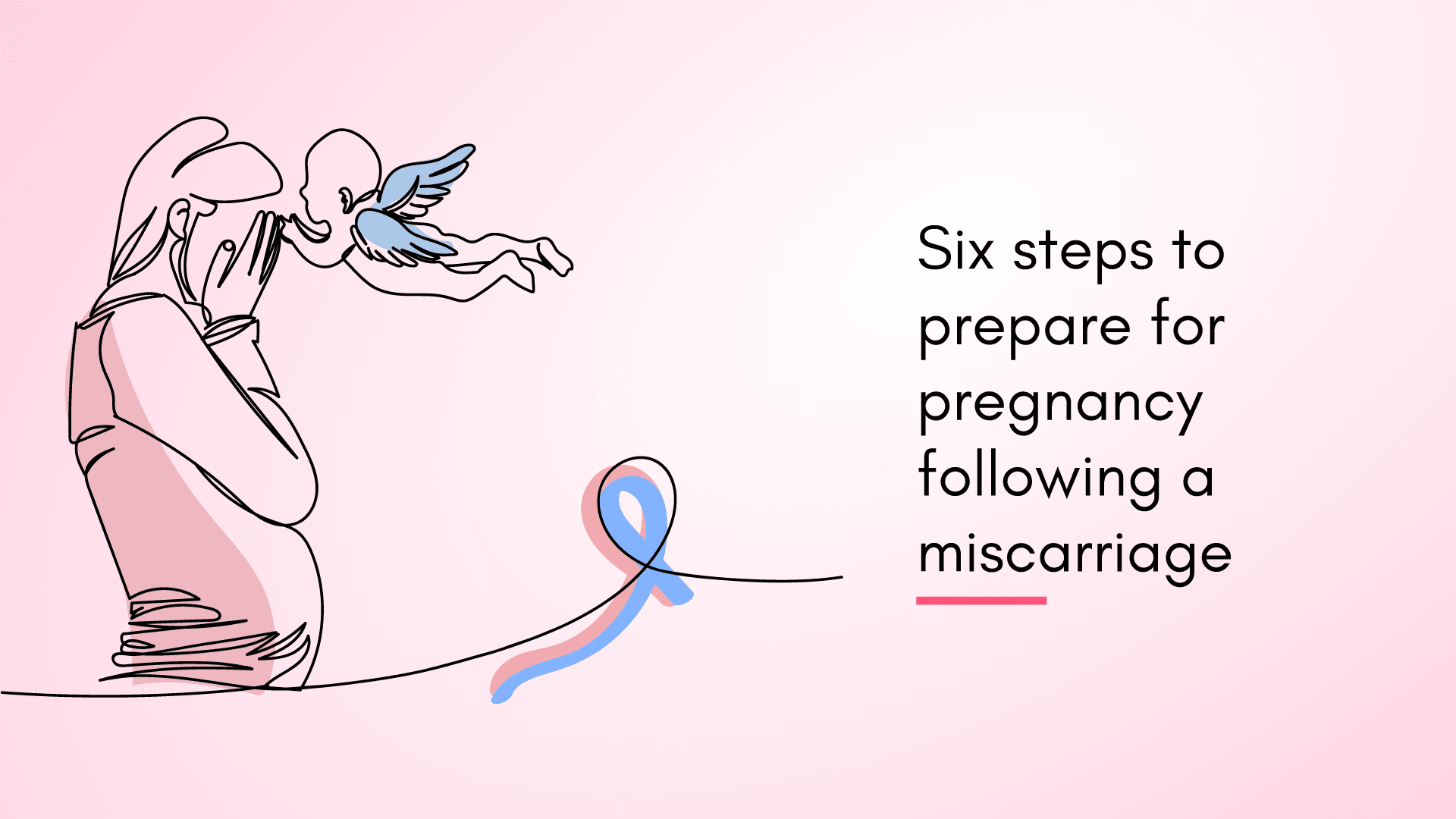Experiencing a miscarriage is a challenging and emotional phase that can lead to self-doubt and concerns about future pregnancies. Understanding the various causes of miscarriage is crucial for moving forward. This blog provides essential information on preparing for pregnancy after a miscarriage.
Also Read: Tips for a Healthy Pregnancy Following Successful Fertility Treatment
What is Miscarriage?
A miscarriage, or spontaneous abortion, refers to the loss of a pregnancy before 20 weeks of gestation. Most miscarriages happen before women know that they’re pregnant, leading to 10%-20% of pregnancies ending within the first 20 weeks of pregnancy.
The term “miscarriage” is often labeled as a woman’s mistake; however, there are many reasons for miscarriage that are curable and treated after a complete examination of a woman’s health condition. Moving toward healing and mental peace helps couples suffer the phase.
Suggested Read: Vaginal Swelling in Pregnancy: Tips and Remedies
Step 1: Understanding the Causes of Miscarriage
Here are some major causes of miscarriage that couples should understand:
1. Abnormal Chromosomes & Genes
Most miscarriages occur due to chromosomal abnormalities that prevent the proper development of the embryo. These abnormalities, which can result from having too many or too few chromosomes, can lead to conditions such as anembryonic pregnancy, intrauterine fetal demise, molar pregnancy, and partial molar pregnancy.
2. Maternal Health Conditions
Other major causes of miscarriage are poor maternal health conditions. For instance, females suffering from uncontrolled diabetes, infections, hormonal problems, uterus or cervix problems, thyroid disease, and obesity.
3. Environmental & Lifestyle Factors
A harmful environment and exposure to it become a major reason that increases the risk of miscarriage. It majorly includes high-level radiation that damages the developing fetus, toxic chemicals, and air and water pollutants that lead to severe health conditions, causing miscarriage. In addition, poor lifestyle choices adversely impact pregnancy outcomes, and consumption of alcohol, cigarettes, and drugs significantly increases the risk of miscarriage.
4. Other Major Reasons for Miscarriage
Women over 35 have a comparatively higher likelihood of chromosome abnormalities in their eggs. Additionally, immune system disorders that adversely impact the embryo, blood clotting disorders, and severe trauma are other major causes of miscarriage. Nonetheless, medical conditions, including the following, also cause miscarriage.
- Infection
- Exposure to TORCH diseases
- Hormonal imbalances
- Poor implantation of a fertilized egg in a woman’s uterine lining.
- Uterine abnormalities
- Incompetent cervix
- Severe kidney disease
- Congenital heart disease
- High Diabetes
- Thyroid disease, and
- Severe Malnutrition
Also Read: Can progesterone improve chances of pregnancy?
Step 2: Identifying Miscarriage Triggers
Couples must recognize the symptoms and risks associated with miscarriages. Major miscarriage symptoms include:
- Bleeding from a woman’s uterine area or vagina. Bleeding can be filled with severe pain or no pain at all.
- Severe pain or cramps in the pelvic area.
- Fast heartbeat and the fluid that passes from the vagina.
Also Read: Understanding Recurrent Pregnancy Loss
Associated Risk Factors
- Women over 35 are more likely to experience miscarriages due to chromosomal abnormalities in the developing embryo.
- Long-term medical diseases can negatively impact overall health conditions and become one of the main causes of miscarriage.
Also Read: Essential Guide to Pregnancy Complications
Step 3: Nutritional Guidance: Foods to Eat After Miscarriage
Under the guidance of nutritional experts, individuals are exploring the most beneficial diet and specific foods to consume after a miscarriage to enhance their likelihood of a successful pregnancy in the future. Here are some of them
1. Protein-packed Foods: Protein-packed foods like milk, cheese, lentils, fish, and eggs can help your body recover after a miscarriage. However, patients may select from both non-vegetarian and vegetarian options.
2. Iron-rich Foods: Beans, dates, figs, lentils, peaches, green leafy vegetables, sesame butter, brown rice, etc., are recommended after miscarriage.
3. Calcium-rich Foods: Professionals recommend dairy products like milk, cheese, and yogurt and non-dairy products like green vegetables and seafood. These foods must be on your diet after miscarriage.
4. Magnesium-rich Foods: Whole wheat spinach, quinoa, almonds, cashews, and peanuts are preferable foods to consume post-miscarriage.
5. Fruits and Vegetables: Green vegetables and fresh fruits are also recommended when challenging the causes of miscarriage.
6. Stay Hydrated: Ensure you drink sufficient amounts of water regularly.
Also Read: Role of Diet, Nutrition in Overcoming Female Infertility
Step 4: Post-Miscarriage Treatment Options
Healthcare professionals offer complete check-ups and follow-ups to assess the medical condition of patients who have experienced miscarriages. Treatment methods can be broadly categorized into surgical and non-surgical options.
Surgical Treatment Option
Medical professionals may perform dilation and curettage (D&C) or dilation and evacuation (D&E) if a woman’s uterus has not naturally expelled the pregnancy. Major causes of miscarriage necessitate specialized medical staff, who often recommend surgical treatment when the pregnancy is beyond 10 weeks gestation.
Non-Surgical Treatment Option
Non-surgical treatment is recommended for patients who can pass the pregnancy issue naturally. If a miscarriage is not confirmed, patients are monitored closely.
Also Read: Know About High-Risk Pregnancy
Step 5: Optimizing Ovulation After Miscarriage
After appropriate treatment, it is essential to understand the steps required for a healthy pregnancy following a miscarriage. Monitoring ovulation can help increase the chances of conception.
Here are some tips to optimize ovulation after a miscarriage:
1. Understand Miscarriage Related Conditions
The major causes of miscarriage and related conditions are required to be resolved. For instance, many pregnant women assume that they wouldn’t be able to be pregnant twice in their lifetime. Therefore, it becomes important for women to know treatment after miscarriage. It updates them with do’s and don’ts during the second pregnancy.
2. Spare Some Time
It is recommended to have a second pregnancy once patients receive treatment after miscarriage. A woman’s body requires 2-3 months to have usual periods when they try to conceive again.
3. . Be Healthy
Simply put, diet after miscarriage must be decided by examining the patient’s life structure and lifestyle. It updates them with root reasons and causes of miscarriage, making better & informed decisions considering this disease.
4. Use Ovulation Predictors
Another impactful factor is to get the ovulation predictors that help patients know the reasons for miscarriage. Further, individuals must consider using the OPK kit only after they start regularly menstruating after miscarriage treatment.
Step 6: Emotional Preparation and Support
It requires time to get familiar with the reality when the worst phases, like miscarriage, hit. Emotional support from a partner is crucial during this period. Healing and considering a second pregnancy requires time and patience. Providing emotional preparation and support to your partner is essential.
Conclusion
It is better to know the complete details and causes of miscarriage. Moreover, when you prepare for the second pregnancy, it is recommended to address both physical & emotional aspects. If you’re facing a similar medical problem, feel free to contact Ferty9 Fertility Center. The fertility center provides the best treatment options for your current medical conditions.





























